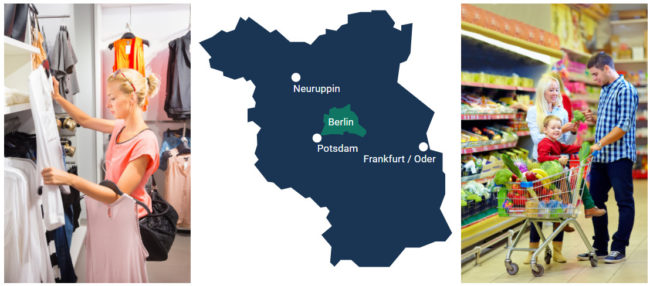
The Handelsverband Berlin-Brandenburg eV is the industry and employers’ association in the Berlin-Brandenburg region.
From this Wednesday, a corona test will apply to customers in retail in Berlin. The Berlin-Brandenburg trade association is responding by setting up corona rapid test stations. Meanwhile, HDE and the textile trade association have concerns that the mandatory test may not be able to be implemented as required by politicians – and in the worst case even lead to falling sales.
In the special session of the Senate on March 27, a new Infection protection measures regulation was passed. The main changes are:
Home office regulations are being pushed to significantly reduce contacts in the professional environment. Commercial and public employers must ensure that a maximum of 50 percent of the office workplaces set up in a workplace in accordance with Section 1 (1). 1 ArbStättV can be used at the same time. Activities are excluded, which must be listed in the workplace itself for imperative reasons – for example due to the necessary customer or patient contact associated with the activity, receiving emergency calls or incidents, for monitoring operational systems, for the functioning of the administration of justice, of the prison system, the core tasks of public administration and for vocational training according to § 1 BBiG .
The obligation to test for citizens (Test & Meet): Retail customers – with the exception of basic services – must always have a daily, negative test result before entering. Buyers of department stores and shopping centers (malls) are required to organize test options for visitors. Body-related services – incl. Hairdressing companies – may only be noticed after prior appointment and with a negative test result certified daily. The same applies to visiting cultural institutions such as museums, galleries and memorials.
Only people who provide evidence of a negative test for an infection may take part in indoor events with more than five people present at the same time. This should also apply to party meetings, assemblies of electoral groups, company meetings or meetings of personnel or works councils. Religious practice as well as demonstrations and the activities of parliament, government and the administration of justice remain unaffected. All citizens are also urged to have themselves tested in one of the 170 locations across the city before private meetings or to examine themselves with so-called self-tests in order to rule out coronavirus infection.
Mandatory test offers will be expanded: All employers will have to offer their employees a free point-of-care (PoC) antigen rapid test at least twice a week or those for self-application under supervision. Upon request, employers are obliged to issue a certificate of the daily test result that corresponds to the model provided by the health administration.
In the future, FFP2 masks will generally be required in closed rooms to ensure better infection protection. This regulation applies:
- for public transport passengers including train stations, airports and ferry terminals as well as other vehicles with changing passengers,
- for patients and accompanying persons when visiting medical practices and other health facilities, provided that this does not prevent treatment in hospitals and care facilities of visitors and patients. Residents, provided they are outside their room or receive a visit for customers in retail stores of all kinds as well as in craft, service and other commercial businesses with public traffic,
- for visitors of libraries and archives, in vocational education and general adult education as well for visitors of cultural institutions and leisure facilities. People employed here remain obliged to wear a medical mask.
- Citizens are urged to wear medical or FFP2 masks at private gatherings.
The amended Infection Protection Measures Ordinance occurs on 31. March 2021 in force.
About The Handelsverband Berlin-Brandenburg eV (HBB)
The Handelsverband Berlin-Brandenburg eV (HBB) emerged on January 1, 2005 from the merger of the General Association of Retailers Land Berlin eV and Retail Association Land Brandenburg eV. As a strong association for the retail trade in Berlin and in the state of Brandenburg, which is valued in the political arena, the HBB has a high level of effectiveness and up-to-date know-how. The approx. 2000 retail companies that are members of the HBB represent more than 85 percent of the market shares in the retail sector in both federal states. Through their membership they strengthen the trade and industry association and thus secure their existential interests.
| Film trailer “25 Years of the Berlin-Brandenburg Trade Association” On YouTube |





